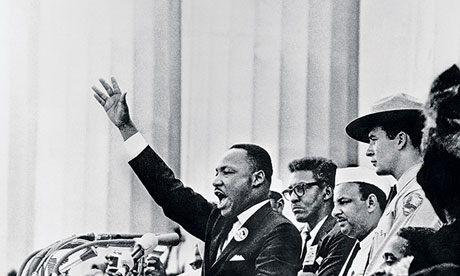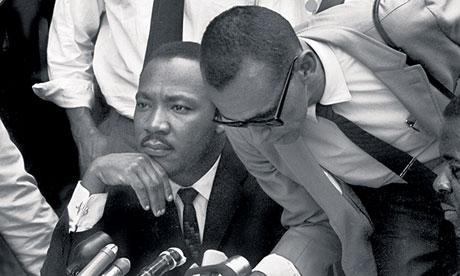Catherina
Catherina's JournalJournalists Grill White House Over Glenn Greenwald Detention Scandal
Journalists Grill White House Over Glenn Greenwald Detention Scandal
The Huffington Post | By Jack Mirkinson Posted: 08/19/2013 2:27 pm EDT

The detention of Glenn Greenwald's partner was a big topic at the White House briefing on Monday.
Deputy press secretary Josh Earnest made some news when he revealed that the United States had been given a "heads up" by Britain that it was going to detain David Miranda, who was held for nine hours at London's Heathrow airport on Sunday.
This got reporters interested. Some of the questions they asked:
"Is (David Miranda) on a watchlist?"
"The United States, when given the heads up, just said, OK?"
"Did the United States discourage the action?"
"Is it fair to say that if the United States had discouraged it, you would tell us?"
"How far in advance (was the US informed)?"
"In advance of his detention, American officials were informed?"
...
Chuck Todd, who did much of the questioning, tweeted:

http://www.huffingtonpost.com/2013/08/19/white-house-reporters-glenn-greenwald-detention_n_3781000.html?ncid=edlinkusaolp00000003
Yes, a very specific list, with a very deliberate purpose
"They spent the entire day asking about the reporting I was doing and other Guardian journalists were doing on the NSA stories.
"The principal point, since they kept him for the full nine hours, is to try and send a message of intimation and bullying.
"I don't understand why they don't realise that all it's going to accomplish is the exact opposite effect - I'm going to report more aggressively and with a more emboldened mind," Mr Greenwald told the BBC.
http://www.bbc.co.uk/news/world-latin-america-23750289
Don't forget Tom Watson lol

Labour's Tom Watson demanded answers from the Prime Minister
The Guardian has also published stories about blanket electronic surveillance by Britain's GCHQ based on documents from Mr Snowden.
A Guardian spokesperson said: "We were dismayed that the partner of a Guardian journalist who has been writing about the security services was detained for nearly nine hours while passing through Heathrow airport.
"We are urgently seeking clarification from the British authorities."
On Twitter, influential Labour MP Tom Watson demanded answers from Prime Minister David Cameron about what ministers knew of Mr Miranda's detention.
...
http://news.sky.com/story/1130270/heathrow-glenn-greenwald-partner-questioned
Heck, while you're at it, don't forget EU Parliament members either. Hannes Swoboda is already on it.
Detention of Greenwald's husband 'extraordinary', says UK Chairman of Home Affairs Select Committee
Detention of Guardian journalist's partner 'extraordinary', says Keith Vaz
Senior MP to seek explanation from police after detention of Glenn Greenwald's partner, David Miranda, at Heathrow airport
Alexandra Topping and Guardian staff
theguardian.com, Monday 19 August 2013 08.46 BST
...
(The chairman of the home affairs select committee) Keith Vaz called the detention of Miranda "extraordinary" and said he would be writing immediately to police to request information about why Miranda was held under anti-terrorism laws when there appeared to be little evidence that he was involved in terrorism.
...
Vaz said he was not aware that personal property could be confiscated under the laws. "What is extraordinary is they knew he was the partner (of Greenwald) and therefore it is clear not only people who are directly involved are being sought but also the partners of those involved," he said. "Bearing in mind it is a new use of terrorism legislation to detain someone in these circumstances (...) I'm certainly interested in knowing, so I will write to the police to ask for the justification of the use of terrorism legislation – they may have a perfectly reasonable explanation. But if we are going to use the act in this way ... then at least we need to know so everyone is prepared."
...
Widney Brown, Amnesty International's senior director of international law and policy, said:
"It is utterly improbable that David Michael Miranda, a Brazilian national transiting through London, was detained at random, given the role his partner has played in revealing the truth about the unlawful nature of NSA surveillance.
"David's detention was unlawful and inexcusable. He was detained under a law that violates any principle of fairness and his detention shows how the law can be abused for petty, vindictive reasons.
"There is simply no basis for believing that David Michael Miranda presents any threat whatsoever to the UK government. The only possible intent behind this detention was to harass him and his partner, Guardian journalist Glenn Greenwald, for his role in analysing the data released by Edward Snowden."
...
Labour MP Tom Watson said he was shocked at the news and called for it to be made clear if any ministers were involved in authorising the detention.
He said: "It's almost impossible, even without full knowledge of the case, to conclude that Glenn Greenwald's partner was a terrorist suspect.
"I think that we need to know if any ministers knew about this decision, and exactly who authorised it."
...
http://www.theguardian.com/uk-news/2013/aug/19/detention-david-miranda-keith-vaz-glenn-greenwald?CMP=twt_fd
Juan Cole- Greenwald Partner falsely detained as Terrorist: How to Create a Dictatorship
Greenwald Partner falsely detained as Terrorist: How to Create a Dictatorship
Posted on 08/19/2013 by Juan Cole
How to turn a democracy into a STASI authoritarian state in 10 easy steps:
1. Misuse the concept of a Top Secret government document (say, the date of D-Day) and extend classification to trillions of mundane documents a year.
2. Classify all government crimes and violations of the Constitution as secret
...
5. Classify environmental activists as terrorists while allowing Big Coal and Big Oil to pollute and destroy the planet
6. Share info gained from NSA spying on public with DEA, FBI, local law enforcement to protect pharmaceuticals & liquor industry from competition from pot, or to protect polluters from activists
7. Falsify to judges and defense attorneys how allegedly incriminating info was discovered
8. Lie and deny to Congress you are spying on the public.
9. Criminalize the revelation of government crimes and spying as Espionage
10. Further criminalize whistleblowing as “Terrorism”, have compradors arrest innocent people, detain them, and confiscate personal effects with no cause or warrant (i.e. David Miranda, partner of Glenn Greenwald)
...
http://www.juancole.com/2013/08/greenwald-terrorist-dictatorship.html
Statement from Freedom of The Press Foundation on the outrageous detention of Greenwald's partner
A statement from @FreedomofPress on the outrageous detention of @ggreenwald's partner by the UK over the NSA stories https://pressfreedomfoundation.org/blog/2013/08/investigating-acts-journalism-under-terrorism-laws-hallmark-authoritarian-regimes …
August 18, 2013
By Trevor Timm Follow @TrevorTimm
In an outrageous and unacceptable attack on press freedom, Guardian journalist Glenn Greenwald’s partner, David Miranda, was detained for almost nine hours at Heathrow airport in London earlier today under section 7 of the UK’s pernicious Terrorism Act. Miranda was returning to his home in Brazil after a week-long visit with documentarian Laura Poitras. Miranda, whose flights were paid for by the Guardian, was reportedly bringing important documents back to Greenwald on USB thumbdrives.
Greenwald and Poitras (both of whom are on our board of directors) have been the central journalists reporting the recent stories on the NSA, based on leaked documents provided to them by whistleblower Edward Snowden. Miranda was detained for eight hours and fifty-five minutes by security, for much of it he was denied access to a lawyer, while being asked questions about the NSA. His electronics, including his phone, computers, and USB thumbdrives, were confiscated and not returned when he was released.
It is unclear what the UK government was trying to accomplish by detaining Miranda. Likely, it was meant as some form of intimidation. But surely, it will backfire. Investigating acts of journalism under “terrorism” laws and detaining family members of reporters are hallmarks of authoritarian regimes.
Regardless of whether this was an aberration or somehow a horrible mistake, it sends exactly the wrong example to countries the US and UK regularly excoriate for human rights abuses. Take, for example, this report from Human Rights Watch from a year ago: “The Iranian government has been intimidating and detaining relatives and friends of foreign-based Persian-language journalists to obtain information or silence them.”
And until UK government takes swift action to rectify this injustice, other journalists — and their loved ones — should be on alert. Not only was Miranda detained, but Greenwald's journalistic work-product was seized. As Andrew Sullivan wrote, “So any journalist passing through London’s Heathrow has now been warned: do not take any documents with you. Britain is now a police state when it comes to journalists, just like Russia is.”
The most appalling part of the story is the use of UK’s “terrorism” law as a guise to detain David, who, of course, has nothing to do with terrorism. Just like the Patriot Act and FISA Amendments Act, which have been used by the NSA to create mass domestic surveillance databases of millions of innocent people, the “terrorism” law in the UK declares the “power to stop and question may be exercised without suspicion of involvement in terrorism.”
The NSA stories published by Greenwald and others have prompted an unprecedented debate in the US about the government’s vast surveillance powers, and major reforms now seem likely to pass Congress. Maybe this incident will spark renewed outrage over Britain “terrorism” law, which thousands of innocent people have been subject to, and laws permitting suspicion-less border searches in general.
Ironically, this incident comes the same day as a long profile in New York Times Magazine of Poitras, who has shamefully been the subject of similar harassment at the border by the US for years, solely because she produces journalism that the United States government apparently does not like. It’s unknown whether the US had any involvement in the detention of Miranda but questions should be asked as to what they knew and when.
In the meantime, the UK government owes Mr. Miranda a prompt apology, return of the property they stole from him, and assurances it won’t happen again.
https://pressfreedomfoundation.org/blog/2013/08/investigating-acts-journalism-under-terrorism-laws-hallmark-authoritarian-regimes
ACLU: Who are the watchers? At least 5,000 are alleged child pornographers, report finds
#NSA RT @privacysos: Who are the watchers? At least 5,000 are alleged child pornographers, report finds http://bit.ly/139CIpj
Who are the watchers? At least 5,000 are alleged child pornographers, report finds
Submitted by sosadmin on Fri, 07/12/2013 - 13:58
NSA, FBI, CIA and private contractors have access to the private communications and associational information of hundreds of millions of people. Oversight is practically nonexistent. Seventy percent of the 'intelligence' budget is farmed out to private war and spy contractors, an industry that has been implicated in various obscene scandals over the years, among them the 'Afghanistan Butt Shots' crisis and torture lawsuits, to name just two.
Very rarely do we get a glimpse into the lives of the people who monitor us. It's a one way mirror, for the most part. But we do get some insights into this secretive world, and what we find can be horrific. One breathtaking federal investigation gives us plenty of reasons to worry about the people who sit behind monitors, headphones in, watching and listening in the shadows.
AP reports:
A major federal investigation has found that dozens of military officials and defense contractors, including some with top-level security clearances, allegedly bought and downloaded child pornography on private or government computers.
The Pentagon on Friday released investigative reports spanning almost a decade that implicated individuals working with agencies handling some of the nation's most closely guarded secrets, including the National Security Agency and the National Reconnaissance Office, which operates U.S. spy satellites.
Defense workers who purchased child porn put the Department of Defense, "the military and national security at risk by compromising computer systems, military installations and security clearances," a 2007 investigative report said.
The US government wants to capture Edward Snowden to prosecute him under the Espionage Act of 1917, so it no doubt took a hard line against intelligence community and DoD employees who downloaded child pornography on government machines, right?
Wrong!
Because none of the children in the images could be identified, as required for prosecution through the Federal system, the U.S. Attorney's Office declined to take action.
One case in California involved more than a dozen individuals with ties to the Defense Department, including contractors and active members of the military – several of whom had top secret clearances. At least nine cases were closed because investigators lacked "current, relevant evidence," the documents state.
Ok, maybe the US won't prosecute child pornographers in the military and intelligence institutions, but surely these are just a few bad apples, right?
Wrong again!
Because many important details are blacked out in the documents, it is impossible to determine precisely how many individuals with ties to the Pentagon were either charged with or suspected of receiving child pornography.
The federal investigation of military workers was part of a broader effort initiated in 2007 under the code name "Operation Flicker." That project had identified more than 5,000 individuals who subscribed to child pornography websites.
The surveillance state: even creepier than you ever could have imagined.
http://privacysos.org/node/1118
Statement on Report NSA Violated Privacy Rules from Congressman Jim Himes (CT-4)
Press Release
Himes Statement on Report NSA Violated Privacy Rules
Aug 16, 2013 Issues: Civil Rights, Intelligence
WASHINGTON, DC—Congressman Jim Himes (CT-4) released the following statement regarding a leaked internal audit from May 2012 showing that the National Security Agency (NSA) violated privacy rules related to the federal government’s intelligence collection programs 2,776 times over a one-year period. According to the audit, 1,904 of these instances were “roamers,” in which a foreigner whose cellphone was being wiretapped without a warrant came to the United States, where warrants are required.
“I am quite disturbed by the news that the NSA violated laws and internal procedures established to protect Americans’ privacy nearly 3,000 times in just one year. I have been assured by the leadership in the intelligence community and by the President that there has been no abuse of these programs. These assurances factored into my decision to vote against the Amash amendment to the Defense Appropriations Act, so this new report is profoundly concerning to me. While I understand that a majority of these incidents, particularly those related to roaming, were mistakes, the bottom line is that when we are talking about constitutional rights, we need a system and culture that is zero-tolerance—the NSA must foster a culture and systems that fully protect the rights of the American people as it works to protect us from harm.
“It is clear based on today’s reports that we need to examine and improve those systems and culture within the NSA and improve congressional oversight of our nation’s intelligence gathering. While a system of this magnitude will never be without errors, the intelligence community should lean into, not away from, reporting violations of privacy to Congress. I stand ready to work with my colleagues on the committee to ensure these kinds of mistakes do not happen again and that the civil liberties of the American people are being fully respected.”
http://himes.house.gov/press-release/himes-statement-report-nsa-violated-privacy-rules
Possibility of 1000s of NSA violations unacceptable. Many intel comm members unaware of this report. In fact, we have been told no abuses.
https://twitter.com/jahimes/status/368511330551992321
Martin Luther King: the story behind his 'I have a dream' speech. "Aw, shit. He's using the dream."
Martin Luther King: the story behind his 'I have a dream' speech
It's 50 years since King gave that speech. Gary Younge finds out how it made history (and how it nearly fell flat)
Gary Younge
The Guardian, Friday 9 August 2013 21.00 BST

Washington DC, 1963, Martin Luther King reaches the climax of his speech. Photograph: © Bob Adelman/Magnum
The night before the March on Washington, on 28 August 1963, Martin Luther King asked his aides for advice about the next day's speech. "Don't use the lines about 'I have a dream', his adviser Wyatt Walker told him. "It's trite, it's cliche. You've used it too many times already."
...

King with his adviser Wyatt Walker, who urged: ‘Don’t use the lines about “I have a dream”. It’s cliche.’ Photograph: Tom Self/Birmingham News/Polaris/Eyevine
...
A few hours after King went to sleep, the march's organiser, Bayard Rustin, wandered on to the Washington Mall, where the demonstration would take place later that day, with some of his assistants, to find security personnel and journalists outnumbering demonstrators. Political marches in Washington are now commonplace, but in 1963 attempting to stage a march of this size in that place was unprecedented. The movement had high hopes for a large turnout and originally set a goal of 100,000. From the reservations on coaches and trains alone, they guessed they should be at least close to that figure. But when the morning came, that expectation did little to calm their nerves. Reporters badgered Rustin about the ramifications for both the event and the movement if the crowd turned out to be smaller than anticipated. Rustin, forever theatrical, took a round pocket watch from his trousers and some paper from his jacket. Examining first the paper and then the watch, he turned to the reporters and said: "Everything is right on schedule." The piece of paper was blank.
...
King was winding up what would have been a well-received but, by his standards, fairly unremarkable oration. "Go back to Mississippi, go back to Alabama, go back to South Carolina, go back to Georgia, go back to Louisiana," he said. Then, behind him, Mahalia Jackson cried out: "Tell 'em about the dream, Martin." Jackson had a particularly intimate emotional relationship with King, who when he felt down would call her for some "gospel musical therapy".
...
"Go back to the slums and ghettoes of our northern cities, knowing that somehow this situation can and will be changed," King said. Jackson shouted again: "Tell 'em about the dream." "Let us not wallow in the valley of despair. I say to you today, my friends." Then King grabbed the podium and set his prepared text to his left. "When he was reading from his text, he stood like a lecturer," Jones says. "But from the moment he set that text aside, he took on the stance of a Baptist preacher." Jones turned to the person standing next to him and said: "Those people don't know it, but they're about to go to church."
...
"So even though we face the difficulties of today and tomorrow, I still have a dream."
"Aw, shit," Walker said. "He's using the dream."

Crowds in front of the Washington Monument at the March on Washington. Photograph: © Bruce Davidson /Magnum Photos
...
Watching the whole thing on TV in the White House, President John F Kennedy, who had never heard an entire King speech before, remarked: "He's damned good. Damned good." Almost everyone, including even King's enemies, recognised the speech's reach and resonance. William Sullivan, the FBI's assistant director of domestic intelligence, recommended: "We must mark him now, if we have not done so before, as the most dangerous negro of the future of this nation."
...
• Adapted from The Speech: The Story Behind Martin Luther King's Dream, by Gary Younge, published on 22 August by Guardian Books at £6.99. To order a copy for £5.59, including mainland UK p&p, go to theguardian.com/bookshop or call 0330 333 6846.
http://www.theguardian.com/world/2013/aug/09/martin-luther-king-dream-speech-history
The Misremembering of ‘I Have a Dream’
The Misremembering of ‘I Have a Dream’
Fifty years after the March on Washington, Dr. King’s most famous speech, like his own political legacy, is widely misunderstood.
Gary Younge
August 14, 2013 | This article appeared in the September 2-9, 2013 edition of The Nation.

In this Aug. 28, 1963 file photo, Dr. Martin Luther King Jr. acknowledges the crowd at the Lincoln Memorial for his "I Have a Dream" speech during the March on Washington. (AP Photo/File)
Adapted from The Speech: The Story Behind Martin Luther King Jr.'s Dream, by Gary Younge. (Haymarket Books)
When Dr. Martin Luther King Jr. took the podium on August 28, 1963, the Department of Justice was watching. Fearing that someone might hijack the microphone to make inflammatory statements, the Kennedy DOJ came up with a plan to silence the speaker, just in case. In such an eventuality, an official was seated next to the sound system, holding a recording of Mahalia Jackson singing “He’s Got the Whole World in His Hands,” which he planned to play to placate the crowd.
?
Half a century after the March on Washington and the famous “I Have a Dream” speech, the event has been neatly folded into America’s patriotic mythology. Relatively few people know or recall that the Kennedy administration tried to get organizers to call it off; that the FBI tried to dissuade people from coming; that racist senators tried to discredit the leaders; that twice as many Americans had an unfavorable view of the march as a favorable one. Instead, it is hailed not as a dramatic moment of mass, multiracial dissidence, but as a jamboree in Benetton Technicolor, exemplifying the nation’s unrelenting progress toward its founding ideals.
...
Perhaps the best way to comprehend how King’s speech is understood today is to consider the radical transformation of attitudes toward the man who delivered it. Before his death, King was well on the way to being a pariah. In 1966, twice as many Americans had an unfavorable opinion of him as a favorable one. Life magazine branded his anti–Vietnam War speech at Riverside Church “demagogic slander” and “a script for Radio Hanoi.”
...
It is implausible to imagine that, were King to be raised from the dead, he would look at America’s jails, unemployment lines, soup kitchens or inner-city schools and think his life’s work had been accomplished. Whether one believes that these inequalities are caused by individuals making bad choices or by institutional discrimination, it would be absurd to claim that such a world bears any resemblance to the one King set out to create.
Nor is there anything to suggest that view would have been much altered by the presence of a black man in the White House. The claim that Obama’s election has a connection to King’s legacy has some substance. As Obama himself has often conceded, his election would not have been possible without the civil rights movement, which created the conditions that allowed for the arrival of a new generation of black politicians. But the aim of the civil rights movement was equality for all, not the elevation of one.
...
http://www.thenation.com/article/175764/misremembering-i-have-dream
Profile Information
Name: CatherinaGender: Female
Member since: Mon Mar 3, 2008, 03:08 PM
Number of posts: 35,568